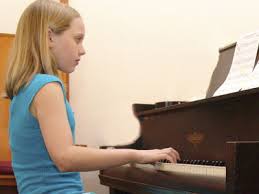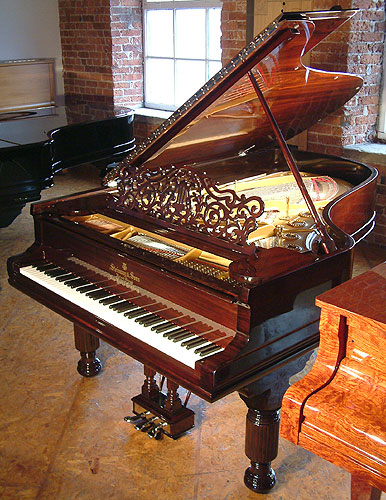Friday 24 July 2009
Getting started with playing the piano

A Nice looking upright piano
In my first article I explored the world of the piano from a birds-eye view and talked a bit about the benefits of playing this instrument. I didn't intend to portay piano playing as the panacea for all ills, but I have been fortunate to see some of the positive outcomes that piano playing has produced in various different situations and in the lives of many people. I am also biased because I play the piano and believe it has been very helpful to me in many ways over the years.
One of the questions I am frequently asked by adults is 'Am I too old to start learning to play a musical instrument?' There is no doubt that learning to play from a young age is by far the best option, but this is not an option that is open to you if you are 40 plus! I have taught people who are complete beginners at the age of 50 plus and even in their 70's. I came across one teacher some years ago who taught several people who had retired at 65, become tired of going on holidays all the time, fed up with TV programmes after a while and decided to take up piano lessons. They were taking exams, Grades 1-3 even if it meant going in to the examination room with the help of a zimmer frame! The success of embarking on a piano course will depend on how much time you devote to it and how much you take a liking to it.
I have sometimes encountered people who have always wanted to learn to play the piano but have never had the opportunity until much later in life. They have started having lessons but already have a lot of other hobbies and commitments and are unable to devote time to regular practice. They soon fall by the wayside and wonder why the project has not been a success. There are others who realize that the investment of time in practising and learning some background and theory is important. Their dedication is usually rewarded and they get results even if it takes a while and even though they realize they may never become International concert artists.

In the case of youngsters wanting to learn to play the piano, sometimes they show the desire to want to do so at the age of 4 or 5. When I receive enquiries from the parents of such young children I usually ask them to wait a while and see if they continue to want to play or if it just a five minute wonder. I don't usually like teaching youngsters until they are able to read quite well because teaching them to read music while they are learning to read English is a tall order. There are some exceptions to this, when a youngster shows some natural musical gifting that needs to be encouraged as soon as possible, unfortunately I have personally found this to be quite rare.
Some youngsters start having piano lessons and after a few lessons they want to give up because it looks too difficult or perhaps they don't feel it is for them. My advice to parents and guardians is not to give in to their whim too easily, in some cases piano lessons become something that has been 'done' by them, along with karate, judo, ballet, gym club and pony trekking. I know of a case where someone started having lessons because a brother or sister was learning and the parents felt equal opportunity should be given. They wanted to give up lessons after about a term had passed but the parents insisted that they should continue with it for a while. The 'unwilling' individual was the one who ended up taking the piano exams, entering festivals and going on to become a musician. The older sibling who originally wanted lessons didn't pursue piano playing in the long term. Life is full of surprises!
I have heard of instances where piano tuition is offered as a short course. Sometimes claims are made that you can learn to play in a matter of a few weeks or months. I have never come across anyone who has succeeded in achieving this extremely desirable outcome. A piano tuner I once knew used to tell his customers that their children could learn enough to pass Grade 1 in six months from starting to play, pass Grade 2 in the next six months and so on, thus presumably getting to Grade 8 in approximately 4 years. I would love to have known the music teacher he had met who had managed to achieve such excellent and uniform rates of progress! I am pretty certain he didn't teach the piano himself.
In summary, the best option open to beginners is to find a teacher and book in for a course of lessons. An instrument will be required for practise at home, this could be a piano or a keyboard to begin with but an actual piano or electric piano is preferable. This is because a keyboard only usually has a five octave range and doesn't normally have weighted keys and touch sensitivity.
An alternative to individual lessons is to book in for a course of group keyboard lessons. In some areas these are quite readily available and can work out cheaper than individual lessons. The drawbacks to this kind of tuition are that the members of the group will progress at different rates and you will not readily get much individual attention in the time.
In the next article I hope to go into the minefield of finding the right instrument for you and other connected issues. Meanwhile, if you have any questions about this article, please contact me at the email address below.

email: erikretallick@yahoo.co.uk
Thursday 16 July 2009
Would you enjoy playing the Piano?

There are other days when everything I play seems just lifeless and wooden, the simplest of pieces has notes which I thought were never there before, improvising is an uphill struggle and I wonder why on earth anyone bothered to invent the piano! Out of all the different instruments I play, the piano is the most lovely and beautiful, but it can also be the most frustrating and unforgiving master. My relationship with this instrument is the most challenging and often therefore the most rewarding when it works well.
I believe that when one plays the piano very much is dependent on the attitude and mood with which it is approached. You have to be on the right wavelength to get good results. However, this should not be an excuse for not practising regularly, after all any good relationship has to be worked at.
Apart from the sheer enjoyment and satisfaction of playing the piano, I believe there are many benefits to the body and the mind of indulging in what may appear to many to be a selfish activity when it often takes place (especially in my situation) in the silence of ones own home.
In terms of the physical aspects of playing the piano there are a number of considerations.
1) Playing the piano involves use of a whole lot of the body, the fingers, hands, arms, shoulders, neck, back, and feet. In fact when you watch a professional pianist playing, for example, a Rachmaninov piano concerto, he or she often appears to be having a complete physical workout.
2) Piano playing develops co-ordination between the left and right sides of the body, which are controlled respectively by the right and left sides of the brain. For youngsters, especially those inclined towards dyspraxia or lack of developed co-ordination this can be of great benefit, especially in the early stages.
3) In piano playing relaxation is produced physically through the tension and relaxation of specific muscle groups and through the flowing body movements which are required.
4) Playing the piano helps to produce faster physical responses and reactions. Apparently a lot of youngsters develop quick reactions through playing computer games, perhaps playing the piano would enable them to find another alternative means of achieving this goal. It would also give them a welcome change of activity.
I want to outline now a few of the mental and emotional benefits of playing the piano which overlap and interact with the physical benefits I have investigated earlier.
1) Piano playing focuses the mind very effectively, as the performer has to read the music and internally hear the music before playing it. This involves great power of concentration, more than that required for reading where the words read remain internalised rather than being externally projected through the body into physical action.
2) The projection and expression of feelings and emotions into the music can be a cathartic experience, similar to that which can be achieved through drama, dance and painting.
3) In playing the piano, if one allows the music to work its way through the mind and body, there can be a great emotional release. This can have an effect on enhancing our problem solving abilities and enable the mind to be free for further creative thinking and activities.
The above lists are by no means exhaustive, I'm sure many of you could comment on other physical and mental benefits to be gained by playing the piano.
I have found through my own experience of teaching piano over the last 25 years or so, that piano playing can be very helpful for those experiencing ADHD, dyslexia, dyspraxia, trauma, grief and emotional turmoil. It can bring order and structure to a world view that is distorted and help to restore relationships which are broken. I have seen many people helped through their own musical playing experience and discovery of some of the world's great music.
The piano may be regarded as a miniature orchestra in itself. In future articles I intend to explore how to get started with playing the piano, how to find the right instrument and look at aspects of the wide repertoire available.
If you have any comments or questions about this introductory article please email me at erikretallick@yahoo.co.uk
Labels:
Beethove,
body,
brain,
Kabalevsky,
mind,
Mozart,
music,
performance,
physical exercise,
piano,
Rachmaninov,
Schubert
Subscribe to:
Posts (Atom)